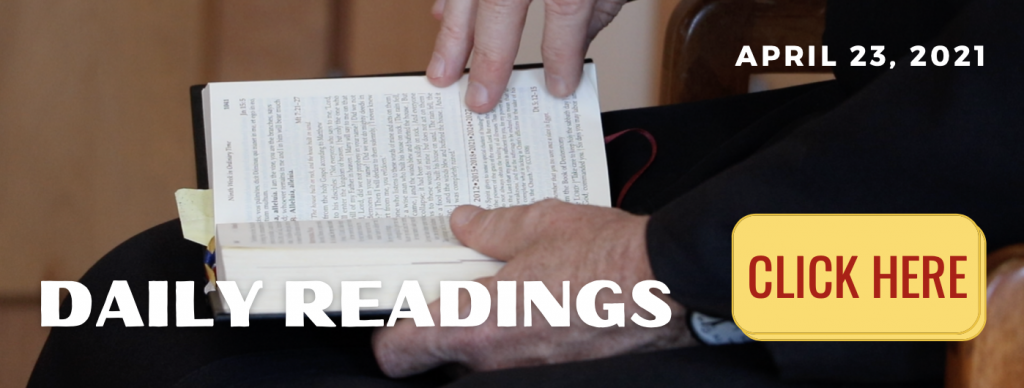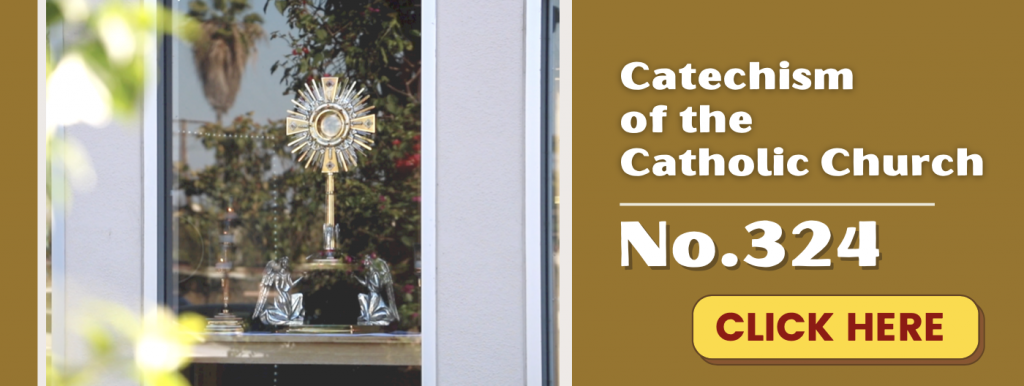


“For greater things you were born.” (Ven. Mother Luisita)
THURSDAY, April 23rd Jn. 6:44-51 “Whoever eats my Flesh and drinks my Blood has eternal life, and I will raise him on the last day. For my Flesh is true food, and my Blood is true drink.”
| PART TWO: The Most Blessed Sacrament and the Immaculate Heart of Mary by Fr. John A. Hardon. S.J. No Adoration of Christ on Earth Without Mary As we read the Gospels, we are struck by the spontaneous adoration of Jesus Christ by those who believed that He was indeed, God Himself in human form. At the calling of the apostles, Nathaniel told Jesus, “Rabbi, you are the Son of God, you are the King of Israel (Jn. 1:49), thus prophesying both Christ’s divinity and humanity. In Caesurae Philippi, where Jesus asked His disciples, ‘Who do you say that I am?” Simon Peter spoke for the others by answering, “You are the Christ, the Son of the Living God.” (Mt. 16:16) Before the raising of her brother Lazarus from the dead, when Jesus asked Martha if she believed that He was the resurrection and the life she said, “Yes, Lord, I believe that you are the Christ, the Son of God, who has come into the world.” (Jn. 11:27) On Calvary, the moment Jesus expired on the cross, the centurion who stood facing Him exclaimed, “Truly this man was the Son of God.” (Mk. 15:39) Then on the eighth day after His Resurrection, the Savior appeared to the doubting Thomas. Jesus told him, “Bring your fingers here, and see my hands; and bring your hand here, and put it into my side; now be not unbelieving, but believe.” (Jn. 20:27) Then Thomas declared in adoration, “My Lord and My God.” (Jn. 20:28) In every case, when believers proclaimed their faith in Jesus Christ, they were speaking to a man who had a human body, human eyes, lips and ears. They were adoring a man indeed, but a man whom they believed was also God. As man, they knew Him to be the Son of Mary; but by faith they recognized Him as the everlasting Son of God. So we return to our second statement that there would be no Christ now on earth for us to adore, except for His Mother Mary. In the Holy Eucharist is present the whole Christ, true God and true Man. Jesus in the Blessed Sacrament is the Second person of the Blessed Trinity, who existed in the bosom of the Father from all eternity. But Jesus in the Blessed Sacrament is also God become man, who was conceived and born in time of His virginal Mother Mary. That is why, over the centuries the church bids us to say the same words to Our Lord in the Eucharist that Thomas said to Him on the Sunday after Easter, “My Lord and My God.” Why? Because in the Eucharist we adore the same Son of Mary who we know is our Creator and Lord. Grace from the Eucharist to Imitate Mary We commonly and correctly speak of Eucharistic Adoration. This is true. It is also the main reason why Our Lord is with us in the Blessed Sacrament, that we might give Him the faithful adoration He deserves as our Incarnate God. But during His visible stay on earth, Jesus was not only worshiped and adored. He was also and fervently asked for every kind of help. And wherever people asked for what they needed, provided they believed, Jesus would grant their request. The Gospels are filled with accounts of miracles worked by the Savior in favor of those who approached Him in faith. No less than for the contemporaries of Jesus in the first century in Palestine, there is no limit to our needs. As a matter of fact, that is why in God’s providence, He makes sure we do have needs. Why is that? So that we might come to ask Him for His assistance, and receive from His goodness the blessings for which we have prayed. Keep in mind, it’s the selfsame Jesus now on earth in the Eucharist, who during His visible stay in Palestine healed the sick and gave sight to the blind, speech to the mute and restored hearing to the deaf. It is now the same Jesus who delivered those possessed by the devil and even raised the dead back to life. Yet, Jesus, the Son of Mary, is in the Blessed Sacrament not only to provide for our physical or temporal needs. He is here mainly to give us the graces we need for our souls. And what are the graces that we mostly need? We need the light and strength that only He can give to enable us to overcome sin. We need His supernatural help to practice the virtue of charity in loving God as He deserves, and loving others patiently and mercifully out of love for Him. What are we saying? We are admitting our sinfulness; that we are always prone to sin, and therefore, need divine help to overcome temptation so that we may gain sanctity. We are admitting our selfishness, and therefore, our constant need fir divine help to gain in charity. Where can we obtain this divine help if not from Jesus Christ, and especially from Jesus Christ in the Blessed Sacrament of the altar! Growth in Sanctity All the great Eucharistic saints of history testify to the power available to us to become holy. The secret is to know where to obtain this power. Where is that? In the Blessed Sacrament. Let me quote a short paragraph from Saint Peter Julian Eymard: Do not go looking for Our Lord in heaven. He is much nearer to you. It is a good thing no doubt, to yearn towards His throne from time to time and to desire His glory. But in ordinary practice of life, it is necessary that it is in the Blessed Sacrament that you should look for and find Him. (The Eucharist and Christian Perfection, 1, pp. 92-93) This is the language of those who have learned from experience how important or better, indispensable is prayer before the Blessed Sacrament to obtain the graces we so desperately need to avoid sin and grow in holiness. Growth in Charity No less than our progress in sanctity, so our growth in charity depends on the Holy Eucharist. It is mainly from the sacrifice of the Mass, Holy Communion, and the Real Presence that we obtain the means we need to practice the virtue of selfless love of others, which is the principal way we show our love for God. Remove the Eucharist and it becomes impossible to live up to Christ’s humanly impossible commandment to love one another as Christ has loved us. It is no coincidence, but part of Divine Providence that Jesus did two things on the night before He died: 1) He gave us the New Commandment of heroic charity, as the sign of being His followers, and 2) He gave us the Holy Eucharist. The one stands by the other. We shall be only as patient, and kind, and generous, and charitable as we are living Eucharistic lives. We speak of the power of selfless love. We could just as well speak of the virtue of the Eucharist. Why? Because it is the Eucharist that mainly gives us the power to give ourselves to others in self-denying charity. The Imitation of Mary We began this conference by saying that except for Our Lady we would not have the Holy Eucharist. We end the conference by saying that except for the Eucharist we could not imitate Mary who is the perfect model for the imitation of Christ. We have become so accustomed to using the title “Immaculate Heart of Mary” that we may not fully realize what we are saying. We are saying that during her life on earth Mary was immaculate because she was absolutely sinless. We are saying that Mary was the most loving human person who ever lived because the Heart of Mary was always united with the Heart of her Divine Son. On both levels, our task in this world is to strive and struggle to become more sinless, which means more holy; and become more loving which means more selfless, after the example of Mary. Like us, and unlike us, Mary had to live by Faith. How was she sustained in her sanctity through life, and in her practice of charity? By the presence of Jesus all through her days on earth. Jesus was with Mary, in His visible humanity, from the moment of His conception at Nazareth until His glorious Ascension at Jerusalem. Jesus was with Mary, in His invisible humanity in the Eucharist, from the time of His Ascension until her glorious Assumption into heaven. We shall become more Mary-like, and therefore more Christ-like, as we draw strength from the same source that she did, from Jesus Christ who is with us in the Holy Eucharist. When Jesus told the disciples “Come to me, all you who labor and are heavy burdened, and I will give you rest.” (Matthew 11:28), He was speaking to us today. We are laboring and are heavily burdened. Where can we find the grace to be at peace in this valley of tears? In the Holy Eucharist, where Jesus is really present and wants us to be present too. Prayer Mary Mother of God, except for you we would not have Jesus and except for you we would not have the Eucharist, which is Jesus in our midst today. Obtain for us something of your deep faith in the Blessed Sacrament. Grant that we may follow your example here on earth, so that we may share in the joy that you now experience in the visible company of your Divine Son and Our Lord. Amen |